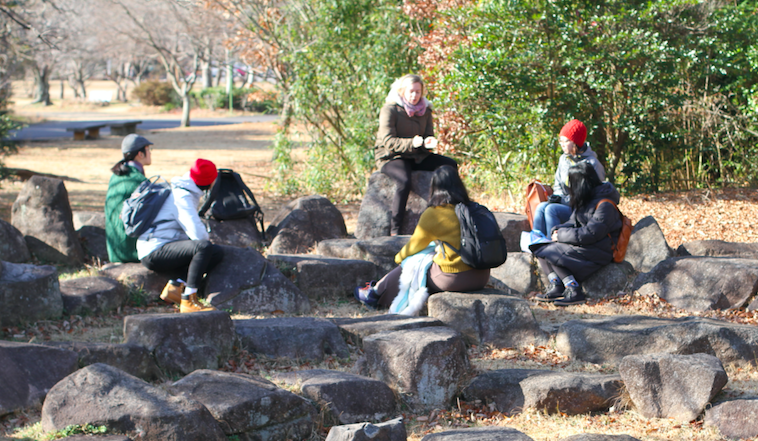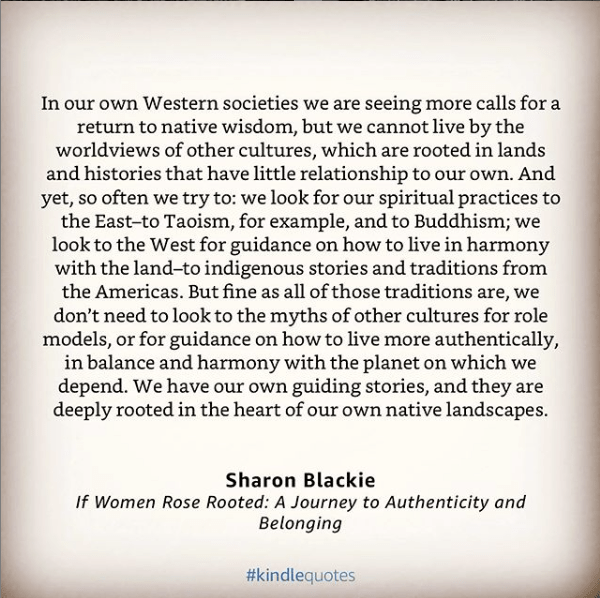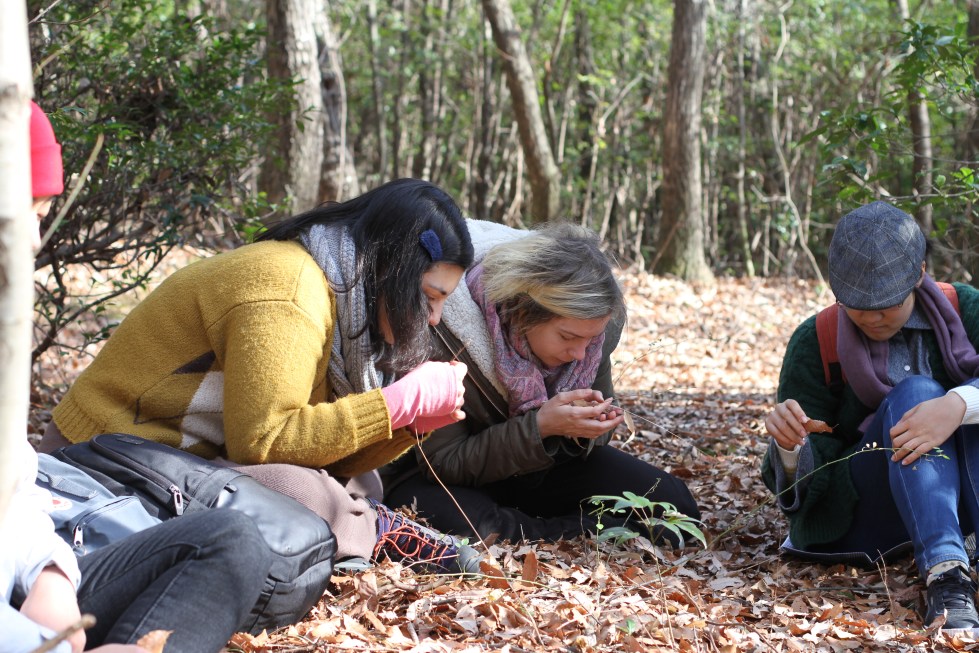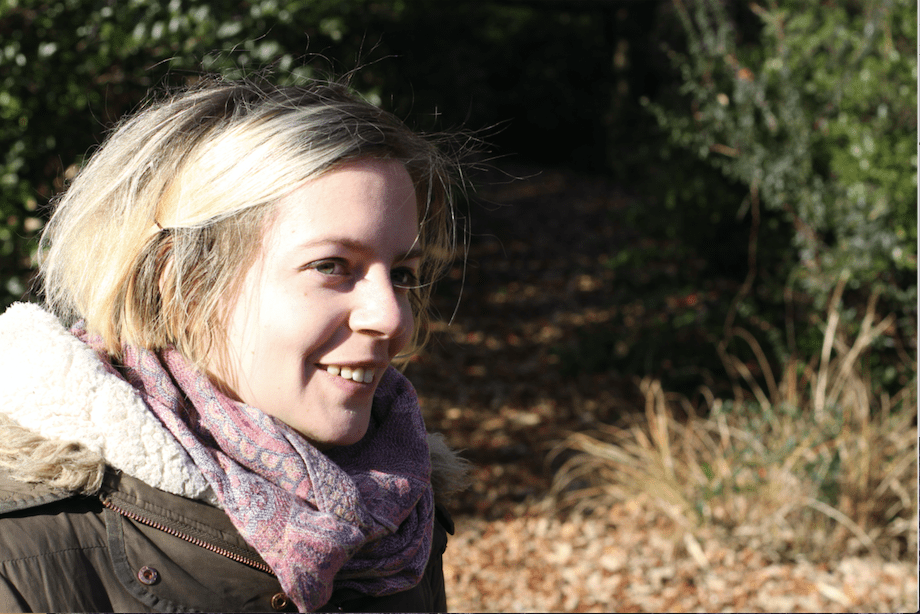Last month, I wrote how forest therapy in Japan is almost becoming an ecofeminist act. Last Saturday, I donated two workshops to the students of the HeForSheClub, the feminist student club of Nagoya University and members of the Girl Power class.
In the first workshop I guided a forest therapy walk. Since two years I am attending regularly their meetings and workshops, and learning a lot about sexual harassment and discrimination in this society. Being an environmental scientist, I see similarities with nature too. Therefore we organised a second ‘meeting’ after the forest therapy walk. It was first time I combined a forest therapy with a storytelling in the forest, and going directly for a ‘heavy topic’. We talked about (different interpretations of) #ecofeminism, read the myth of Amaterasu, the Japanese shinto sun goddess, and also weaved the stories we heard and experienced in her myth and thought together how to retell stories and myths about nature and women, and cope with grief.

What makes me cry?
Yesterday was the day. A winter day in Nagoya is blessed by Amaterasu, the Japanese Shinto sun goddess. When the air is kissed by sun, you (almost) forget winter, darkness and cold thoughts. In the past weeks I cried also a lot, for the Australia’s fires, for reading what happened to the rivers and brooks in my country, for the deforestation in Romania, for the loneliness I felt in Japan, being separated from family and friends during the dark days of midwinter, for the anxieties the PhD and Japanese working culture are giving me… I have been struggling with negative thoughts about discrimination of women, foreigners, animals in the zoo here, and other beings in this more-than-human-world. Injustice is in whole the world, but in Japan… it’s quite obvious. In Japan, I realised even more why I want to spend my energy in healing nature and why I should organise this session, for myself and for others who need the medicine that nature can offer.

Although I have a student status in Japan, it seems I am seen also as a employee. In past two years I did not work in office everyday and move to what I call my coffee bar office or go to the park to reflect, while face-time in Japan is so important. They rather want you to stay 10 hours in lab, pretend you work and even sleep there, instead of working 5 hours more effective and having good sleep hygiene. It is a bit about control. Keep the student in a cage. So, women who also feel the need to take care of family, or actually foreign women who are free from their family’s expectations at home and like to do personal development instead, have to make choices between family and career, and/or mental health and career. And there is also the identity of foreigner. This article in the Japan Times explains the issues for international community today very well. I also study environmental engineering, so I can see the whole ‘control’ aspect and it makes me wonder… is this control the solution? If there is no space for relationships, family, personal growth ,… but only for economic growth? So yes, I am still buying time to make a decision where I really want to be, but in the meantime I cope with these anxieties with forest therapy, and organizing this session.

Why does Japan need more ecofeminism?
Ecofeminism is a movement of academics and activists critiquing patriarchy’s control over women and nature. In Ecofeminism in 2019 and The Snow White Effect: when forest therapy becomes an ecofeminist act , I hinted already about Japanese mindset toward nature and women. The weekend before this session I got to know a Japanese woman at my friend’s yoga class who lived for 6 years in Alaska and talked about other Japanese as if she was not Japanese herself. Using ‘they’. How ‘they’ are only comfortable in nature as long it is under control. A bear is only kawai (cute) as long it is in cage. Or the garden principles are all about control. I told her about the Higashiyama zoo, and how often I pass it, to get to a quiet sit spot in the less crowded botanic garden, and get anxious and even nauseous of all the negative energy, how I can feel the animals (the polar bear) are not happy, and the commercialization. And we talked about how Japanese culture tries to get money out of everything, let people consume and buy things/experiences. It is no surprise that Japan even commercialized forest therapy to an extent it feels more like a tourist experience than a spiritual practice, like how I want to feel it. Another friend who did her Master thesis about sustainability in zoos checked for me and saw Japanese zoos are not under an association which is promoting well-being of animals and there is a lot of chance zoos in Japan are just a ‘showroom’ for human’s satisfaction – and that my intuitive feeling that these animals are not happy is probably right. I also told her about my Norwegian friend’s remark about how all mountains in Japan seem to have ropeway stations and felt like the Japanese wanted to control all the nature, which was a thought I also processed in Meeting Japan’s curse spirits during a Forest Bath.

Deromanticising the western view on Japan
This Japanese women who rooted in Alaska for a while, also mentioned how western people romanticize this ‘lost culture of Japan in harmony with the rest of nature’ as if it still interwoven in its daily culture and institutions. Maybe it did once. As in many other countries. It reminds me to a paragraph I read in a book from Sharon Blakie I am reading these days:

And I want to add that perhaps we are even (over)romanticizing the spiritual practices of the East a bit too much; mostly because we do not live there. We think the grass of the neighbors is greener than us. I also thought, once, that Japan was spiritually more ‘advanced’ in regards to nature, partly after seeing Miyazaki’s movies, with Belgium. Very soon I got very disappointed when I realised it was a wrong image I got. However, I learned I am drawn to these ‘lost cultural values’ and that I should keep them alive in my own practice, and perhaps not only study them. But I grief, as some values honoring the relationship, family with the more-than-human-world are getting lost, yes, and that we are in an cultural crisis, which expresses itself in environmental disasters and global chronic anxieties. Also during the forest therapy walk, when I invited the participants to share some sentences about the nature in their land; a Japanese student (with a German parent and mostly lived there) mentioned she noticed how these lost values are more ‘customs’. I was not the only one who ‘senses’ it.

Only comfortable with women when under control
The same this Japanese woman told about nature is only kawai if it is controlled, is also what I feel about women in Japan. Japanese do not like women who ask too many “difficult” questions. Like me. So I have some troubles. Last weeks I got well-meant advice to “behave more like a Japanese woman” (especially as I am now here for some time and should know the ‘norms and rules’ in the meantime); so be obedient and show my feminine charms to especially the elder Japanese professors, because there are tensions between my supervisor and me. When I applied this advice, I noticed such a different reaction that it was almost scary to realize that my ‘previous activities’ might not comply with the norms and rules of a student/woman in this context.
After the tea ceremony of the forest therapy, the other participants and I stayed in the forest and read the myth about Amaterasu: how she got raped by a male family member (like many women and men in the world), how she hide in a cave (and then everyone in the more-than-human-world around her suffered), and how it was a female goddess called Uzumi who helped her to heal with some dirty jokes and some dancing moves with her hips. We read a part of an academic paper by Kathy Gusewelle (2016), called ‘Amaterasu—A Path to Embodiment after Sexual Trauma.’

Actually, according to some scholars, Japan’s shintoism celebrates diversity of women and men, but it was after buddhism and Confucianism from China got imported in the 6th century, that the idea that ‘women are evil and should be controlled’ penetrated Japan’s spirituality and view. This reminds me a bit what probably happened to my own region of birth, and how the influence of Romans and Christian Church deteriorated the status of women.
By the way, same about animals, I realize now while writing this. Bears are only ‘Kawai’ (cute) when they are controlled, but outside their cage they are evil… Having traveled a lot and met a lot of people, I actually know: Many bears, many women and many men are ok. As a Chinese participant also said: ‘we do not want to get to know the others, so we have a reason to blame and fear them for all bad things.’
Healing
So… we were women and men from Iran, Mexico, India, China, Japan, Germany and Belgium… and we had stories to weave through Amaterasu’s myth. We talked about the fires in Australia, the man who drugged and raped 100 men in UK and other stories we heard or experienced., and how it made us feel… and we talked how to stay positive, through bonding, sharing, and giving positive energy back to the world.
And we talked about the goddess Uzumi and what we can learn from her.
Suddenly, because of the story of Amaterasu and Uzumi, I had to think about a lesson, story or seed I learned in West-Africa. I shared with them also a story about a funeral I witnessed in Agona Swedru, a town in Ghana where I stayed for 3 weeks, like 11 years ago. I was surprised to see the people at this West-African funeral dancing and having fun. And they explained me, a 19,5 year old kid, about their view on loss, and how to cope with grief. And I learned something. About healing.

They also taught me how to dance ‘and move these hips, white girl! You are too stiff, Akua.’ They called me Akua, because I was born on a Wednesday.
Someone from Germany shared that the Jews have also ‘dark jokes’ to cope with the horror of the Holocaust, and she also read some of them.
I learned new things from the others too. That makes having circles in the forest so enriching. The circle as a way of sharing is a practice where every participant is an equal member of the dialogue, every voice has a chance to be heard, every idea considered, and every person treated with respect.

Lately I have been struggling with negative thoughts about discrimination of women, foreigners, animals in the zoo here, and other beings in this more-than-human-world (it’s in whole the world, but in Japan… it’s quite obvious). I have been reaching out to family and friends and nagging and talking and listening to their stories too. I started to make little dirty jokes with other women too. I enjoy listening to poetry and music, and it helps to feel I am not carrying this grief alone. I should dance more.
I realise, when I am sharing and listening to stories, I carry a lot of seeds and stories to help myself when it is getting difficult.
And I have to remind myself again and again. Mornings can look the same, but evenings are all different, because every day can give you different experiences, positive and negative, and every day you have to make the choice… is today hell or heaven?

After spending hours in nature and sharing stories in different circles, a friend invited me for a delicious Iranian meal, made and shared with love. Afterwards, over tea, we found ourselves reading some poetry of Omar Khayyám.
Beyond the earth,
beyond the farthest skies
I try to find Heaven and Hell.
Then I hear a solemn voice that says:
“Heaven and hell are inside.
— Omar Khayyám
That evening I decided: Today was heaven. Thank you.
